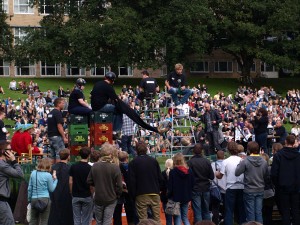
Machine Man by Max Barry
My rating: 4 of 5 stars
This was the first audiobook I ever, uh, heard. It took me 9 hours of listening to Sean Runnette’s good narration over 3 days and it was a unique experience, just walking around while at the same time reading a book, or should I say, following a story. The added layer of voice and sound effects makes it more of a temporal experience than reading the book, with all the good and bad that fact might imply.
Machine Man tells the story of a thirty-something end-all be-all nerd, the kind of person that wanted to be a train when he was a child (yes, be one), loves describing the world with adjectives like “inefficient”, replies to everyting with an “OK” and manages to score zero at any social skills test thrown at him. Give this guy mad engineering skills and an amputated leg and sit back and watch (or read, or listen).
It was very engaging after the third or so chapter, I could see where this was going, but I’d need Z-specs to see how FAR it might go. The plot follows Charlie Newman’s addiction convincingly. I don’t like giving much away when writing my reviews, but I can’t help but applaud the side characters, they are particularly strong here; the ambitious but unappreciated Cassandra Cautery, Lola Shanks (Charlie’s prosthesiologist) and maybe my favourite character in the book, Carl.
Actually, the side characters are so strong they serve to underline Charlie’s single-dimensionality. So comparatively shallow is he that it’s easy to see him merely as the character carrying the plot’s central idea, its gimmick (I don’t like this word). This is perhaps the book’s single biggest problem for me, Charlie’s actions often seem unrealistic and his thoughts completely alien. I cringed all the time when he spoke, or at least when he attempted to. It’s no accident others — even his own self– compare him to a machine even from the start of the book. Are all labcoat-donning specialists so close-minded and awkward? If so, that might explain a lot about science in our world today.
I should however cut Charles Newman’s tormented existence a little slack. It might very well be that Max Barry wanted him to be so exaggeratedly awkward and obsessive-compulsive for comic relief (the book has many dark, uncomfortably funny moments), but also maybe to indirectly comment in his own way on the very foundation of the book’s premise: “biological vs mechanical”, “inefficient vs superior” and perhaps even “mind vs body”, the kind of dualist dilemma that is very natural to follow such what ifs as the one portrayed in Machine Man. What part of us is “us”, and what isn’t “us”? Is the brain more part of us than the rest of our body? Is it, then, that houses our consciousness? These questions are the delicious driving force of the plot and the thinking it provokes.
For example, in a part of the book, Charles says that when people achieve or pull off something (obviously –but exactly because of its obviousness, often overlooked– using their bodies), it’s we, as in our self, our consciousness, that achieved whatever it is that was achieved, the body shrinking into the tool used by the mind/brain it was and has always been, whereas in our failure or when an uncontrolable situation goes bad, we become disassociated with our bodies, they’re Others, and as all typical Others receive the blame for any problem. It reminds me of Heidegger’s take on how Dasein interact with things, the difference between ready-to-hand and present-at-hand. When our body works well, it’s ready-to-hand, it disappears in the background, too obvious to consider, only working as a tool. When it fails to serve us perfectly, its short-comings made obvious, it breaks, it becomes present-at-hand: welcome for optimization, as if it never belonged to us a tall. Machine Man gives food for many such enjoyable parallels.
In fact, Machine Man is one of the most sophisticated cultural items that deal with cyborgs I have encountered and had the pleasure to dive into. It’s definitely filled with all the appropriate nerdy scientific jargon that would satisfy any sci-fi fan (I wonder how many readers will find themselves identifying, even a little bit, with Charles!). But more interistingly, it goes beyond respecting the deep ontological problems that arise from the idea of cyborgs, prosthetics, implants and bio-enhancements, and their implications, if any, for (Cartesian) dualism. It uses these philosophical connotations and gives an interesting and believable story of what meddling with all this might bring about. In other words: it’s not as simple as it looks — it never is — but this time there’s a realistic, (super)human story behind it.
I almost forgot to mention that it has bits of horror and and it’s sprinkled with romance and action and a lot of suspense. You just keep reading, wondering if Max Barry will go all the way. He goes all the way… and then some.
~
I wonder when that had happened, that we had started making better machines than people.
View all my reviews









